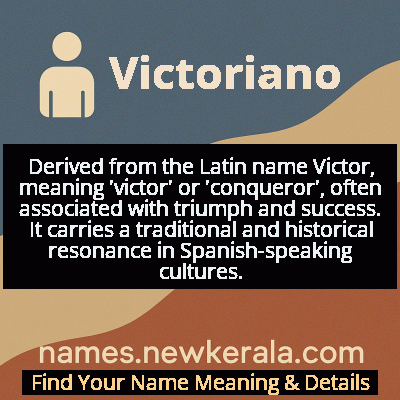Victoriano Name Meaning & Details
Origin, Popularity, Numerology Analysis & Name Meaning of Victoriano
Discover the origin, meaning, and cultural significance of the name VICTORIANO. Delve into its historical roots and explore the lasting impact it has had on communities and traditions.
Name
Victoriano
Gender
Male
Origin
Spanish
Lucky Number
9
Meaning of the Name - Victoriano
Derived from the Latin name Victor, meaning 'victor' or 'conqueror', often associated with triumph and success. It carries a traditional and historical resonance in Spanish-speaking cultures.
Victoriano - Complete Numerology Analysis
Your Numerology Number
Based on Pythagorean Numerology System
Ruling Planet
Mars
Positive Nature
Generous, passionate, energetic, and humanitarian.
Negative Traits
Impulsive, impatient, moody, and can be overly emotional.
Lucky Colours
Red, maroon, scarlet.
Lucky Days
Tuesday.
Lucky Stones
Red coral, garnet.
Harmony Numbers
1, 2, 3, 6.
Best Suited Professions
Military, sports, philanthropy, leadership roles.
What People Like About You
Courage, energy, leadership, generosity.
Famous People Named Victoriano
Victoriano Huerta
Military officer and politician
President of Mexico during the Mexican Revolution
Victoriano Salado Álvarez
Writer and diplomat
Prominent Mexican novelist and historian
Victoriano Rivas
Bullfighter
Renowned Spanish matador
Victoriano Valencia
Composer
Innovative Colombian classical composer
Name Variations & International Equivalents
Click on blue names to explore their detailed meanings. Gray names with will be available soon.
Cultural & Historical Significance
Extended Personality Analysis
The name Victoriano carries strong personality associations rooted in its meaning of 'conqueror.' Those bearing this name are often perceived as determined, strategic, and resilient individuals who approach life's challenges with calculated confidence. They typically exhibit natural leadership qualities, combined with a methodical approach to problem-solving that enables them to overcome obstacles others might find insurmountable. Victorianos are often characterized by their strong sense of responsibility and loyalty, particularly toward family and close associates. While they can display authoritative tendencies, this is usually tempered by a deep sense of justice and fairness. Their competitive nature drives them to excel in their chosen fields, whether in business, arts, or public service. The name suggests someone who values tradition and legacy, often seeing their personal achievements as part of a larger familial or cultural narrative. This combination of strength, strategy, and sentimental loyalty makes Victorianos both respected leaders and devoted family members.
Modern Usage & Popularity
In contemporary naming practices, Victoriano has evolved from its peak popularity in the early 20th century to become a more traditional choice that conveys heritage and strength. Current usage patterns show it's most commonly selected by Spanish-speaking families seeking to honor ancestors or maintain family naming traditions. While not among the most popular baby names in Spain or Latin America today, it maintains a steady presence in countries like Mexico, Argentina, and Colombia. The name has seen a modest revival among parents interested in classic names with powerful meanings, particularly those looking for alternatives to more common Spanish names like Santiago or Alejandro. Digital name databases show Victoriano ranking outside the top 300 names in most Spanish-speaking countries, indicating its status as a distinctive rather than trendy choice. Modern bearers of the name often appreciate its historical depth and the positive attributes of victory and resilience it represents in an era where these qualities remain highly valued.
Symbolic & Spiritual Meanings
Symbolically, Victoriano transcends its literal meaning of 'conqueror' to represent the universal human journey toward mastery and self-realization. The name embodies the archetype of the hero who transforms challenges into triumphs through perseverance and strategic thinking. Metaphorically, it represents the internal conquests we all face—overcoming personal limitations, mastering emotions, and achieving spiritual growth. The '-iano' suffix adds layers of cultural continuity and tradition, suggesting that each victory builds upon those of previous generations. In symbolic terms, Victoriano connects to the concept of 'la lucha' (the struggle) that is central to Hispanic cultural identity—the ongoing effort to improve one's circumstances through determination and hard work. The name also carries subtle religious symbolism, echoing the Christian concept of victory over sin and death. Ultimately, Victoriano symbolizes the human capacity to shape destiny through willpower and resilience, making it a powerful emblem of hope and achievement across cultures and generations.

